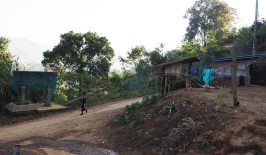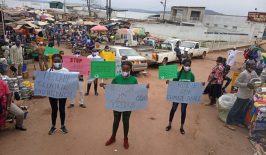The Philippines is one of the toughest countries to live in if you’re an environmental activist. But that’s not stopping the country’s young people, who are demonstrating both on the streets and online and calling for immediate global action on climate change. We talk to Mitzi Jonelle Tan, co-founder of a youth climate action group based in Manila, to find out more.
Not only are people in the Global South often among the most vulnerable to rising global temperatures, but they are also climate activists, educators and changemakers – fighting for a better world, innovating and inspiring others to tackle the issues that we as a planet face. In this series of interviews with environmental activists from Latin America, Africa and Asia, we want to do our bit to decolonise the conversation around climate change and lift up the underrepresented voices within the climate movement. Find all of the interviews in this Voices of Climate Justice series right here.
According to the latest Global Witness report, the Philippines is the second-most dangerous country in which to be an environmental activist. In 2018, it was number one. The latest challenge has seen the Filipino president this year issue a new Anti-Terror Law that could see climate activists increasingly come under threat, labelled as terrorists and even jailed for up to 24 days without warrant or charges. But as we find out in the interview below, the Philippines is also a country where collective grassroots action has resulted in huge successes for the environmental movement in the past – and civil society action continues to show passion and promise.
In Interview #4 in our Voices of Climate Justice series, we talk to Mitzi Jonelle Tan, co-founder of Youth Advocates for Climate Action Philippines about what it’s like being an activist in the Philippines today, where the situation seems at the same time both inspiring and deeply insecure. We discuss the creativity that’s been born from their recent online protests, the need for companies and countries in the Global North to recognise their responsibilities, and her hopes that we can build back a more sustainable society in the wake of Covid-19.
Is climate change something you notice affecting people in the Philippines directly? Is that how you first got interested in the topic?
It’s definitely something affecting people in the Philippines directly, especially our farmers and fishing community. They’re the ones experiencing it first-hand – nature is their livelihood. They are also more vulnerable to the climate crisis since they are part of the poorest sectors of our society. I first learned about the climate crisis in school, when it was mentioned in a lesson, but I only really understood how serious the issue is when the Philippines experienced typhoons that were out of the ordinary and floods that affected many people’s lives.
Through one of the organisations I work for, Agham Youth (“agham” means science in Filipino), which advocates for science and technology to be used to serve the people, I was able to listen to and talk to our indigenous people. Those conversations, and my connections to Agham Youth really opened my eyes to the issues that our country is facing, one of them being the climate crisis.
Tell us about the organisation you are leading, Youth Advocates for Climate Action (YACAP). It describes itself as “the Fridays for Future of the Philippines”. Have you also been organising student climate strikes?
I started protesting with Agham Youth and with other sectors of society for the environment back in 2017. In 2019, along with Saribuhay – a youth environmental organization that advocates for environmental advocacy at the University of the Philippines, we set up an alliance of individuals, youth organisations, and student councils called Youth Advocates for Climate Action Philippines (YACAP). YACAP started organising youth-led climate strikes in 2019.
You and your organisations are all very active on social media. Has digital media and social media played a big role in your work as an activist?
Social media and digital media have been powerful tools to help me understand more about what is happening and raise awareness. As most student activists I think, we started with just ranting and being unhappy online and then we found other people who were unsatisfied as well and that grew into an way to learn more and to eventually raise awareness among others as well. What’s crucial to remember now is that digital media and social media can only do so much. Once the situation permits us, we need to combine online activism with collective action on the streets.
Covid-19 caused a lockdown in the Philippines which led to us having to move our protests online and having to think of more creative ways to call for climate justice. We were able to engage a lot of youth with our campaigns over the past few weeks online, but it has been challenging since it’s hard to reach new people purely through online means. In order to get more people’s attention, we made a song and dance that we put on TikTok to show that the youth must continue calling for climate justice.
What do you think we can learn from the Covid-19 crisis and what are some positives you hope will come out of it?
The positives that I’m seeing from Covid-19 is that since we can’t be on the streets and we’re forced to go online, we’ve found more and more creative ways to reach more people and to connect with each other internationally, which are connections and relationships that we need to maintain in order to tackle this global problem. We are now also given an opportunity to re-evaluate our economy and make sure that in rebuilding it, we can build back a society that is sustainable.
The protests seem to be getting a lot of attention – but that’s not translating into much action on the part of decision-makers. Why do you think that is?
Well, right now given the current public health situation it’s partly understandable. In general, the Philippines’ youth-led climate movement is still growing and in order to see more action on the part of decision-makers, we will need more people with us demanding on the streets for change, not just from the youth sector, but from all sectors of society. We know that these mass protests are effective because in the Philippines, we’ve seen in the past how collective action can help protect the environment – like the community blockade in Nueva Vizcaya that since 2019 has been putting a stop to the operations of OceanaGold, a foreign mining company that has been destroying the Philippine environment for years. On a global level, I think right now it is only in the Global North that we have the huge numbers able to pressure governments, and it’s important for movements in the Global North to support movements in the Global South so that they can grow as well. We will need the youth of the entire world to lead the intergenerational and multisectoral struggle against the climate crisis and the system that is causing it. We need everyone to unite in order for the changes we want to reflect in policies.
What are the key messages behind your particular protest? What does your poster say when you hold it up? And who do you want to see it?
The first thing we call for is climate justice now. The Philippines is one of the most vulnerable countries to the climate crisis and yet our carbon dioxide emissions are so minimal – and this is the same for many vulnerable countries. Climate justice means that multinational companies and countries in the Global North recognise their historical responsibility to drastically reduce their carbon dioxide emissions – as those people who have contributed the most to the climate crisis. This way, underdeveloped countries have the chance to develop and eventually begin their just transition into renewable energy sources. Another call directed towards our local leaders is to stop any new coal-fired power plant projects and to not renew the mining industry permits of the foreign mining industries which have been proven to destroy our environment and the livelihood of our people.
One of our ongoing campaigns now is the call to scrap the country’s new “terror law”. This terror law or the Anti-Terrorism Law of 2020 officially took effect last July 18. Its broad definition of terrorism makes it prone to abuse. It threatens to brand all types of activists, including climate activists as terrorists, but really the people who are most in danger are also those most vulnerable to the climate crisis – the marginalised sectors who are fighting for their rights. The Philippines is already one of the most dangerous countries in the world for environmental defenders according to the latest Global Witness report, and even before this law they were already being tagged as terrorists for fighting for the forests, lands, and seas. They were already being displaced, harassed, and murdered and this law will only make things worse. The Philippine government continues to ignore the pleas of the masses, and of the world. Environmental activists from across the world, including Greta Thunberg and Naomi Klein, have already spoken up against the law by signing and supporting our global petition. The Philippines needs the entire world’s help. When we had a dictator in 1986, it was the powerful protests of the Filipinos coupled with the support of the international community that brought the downfall of our dictator and it’s only a matter of time before history gets repeated.
What do you hope the Global Strike for Climate can achieve?
We need climate justice, and that means justice for our environmental defenders as well, who have always been at the frontline of this struggle but have always been harassed and have had their rights violated. The problem we have is a systemic problem, so we also need a systemic solution. We can’t continue with the greedy, wasteful, profit-oriented system that we have today. We need a system that is planned, needs-based, sustainable, pro-people and pro-environment. When we fight for climate justice, it also means social justice. So the global strike for climate is also the global strike for the true freedom of all people.
Is there anything else you’d like our readers to know?
The climate crisis is not going to go away. We need to embrace the call to save the earth and the youth from all over the world need to always remember to amplify the calls of the marginalised sectors of society. We need collective action, and right now we can’t be on the streets, but we have to keep campaigning so that when we come back from the pandemic we don’t go back to normal – because normal was already a crisis. We must find ways to keep fighting because the injustice and abuses have continued during this pandemic. We must storm the streets and demand climate justice and radical climate action now, because time is running out and people are suffering every day. It’s not even about fighting for our future anymore, it’s about fighting for today.
You can find Youth Advocates for Climate Action Philippines on Facebook and Twitter and by following the hashtags #digitalstrikeph and #yacaphilippines. Agham Youth also have a Facebook page where they post about their mission calling for science and technology to be developed for the common good. You can also find out more about the Philippines’ new Anti-Terror law under the hashtag #JunkTerrorLaw. and sign the online petition against it right here.
Co-authored by Marisa Pettit and Jan Wisniewski






